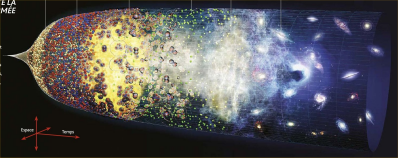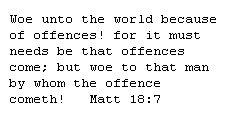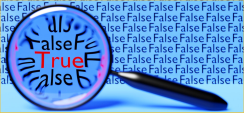


 |
|||
 |
Christianity was supposed to be about becoming like Jesus. |  |
We went in the wrong direction. |
| Blog Archive Home | |
|
Christian Pioneer - eBook for Cell Phone Everything you Know is Wrong |
|
|
|
|
|
|
|
| Question Assumptions (Subject belief to plausibility tests) Evolution is also a good platform to use to introduce a skill set that is advantageous in getting to truth, skepticism. One of the many problems with public education is the unidirectional transmission of information. This tends to make developing children take in whatever they are told as truth and cripples the development of their critical thinking (more about education later). The ability to ask how and why is an essential skill to fend off lies and false assertions.  Those of us who were exposed to public education have the extra difficulty in shaking off years of programming to accept what we are told as truth. Many of the things we were told can greatly benefit from closer scrutiny. If we have accepted something foundational that is wrong, we may become blinded to truth. When presented with the idea that the universe created itself with a big bang when nothing exploded and became everything, then the material that was created organized itself into increasing complexity until it became us, presents a golden opportunity to ask questions.  This thesis, one would think, would be ripe for questions as to how this could happen. When one states that there are no known laws of physics by which this could happen, one is told that there are special laws that operate during these times to cause this to happen. These special laws are simply conjecture with no actual tie to reality. If one looks past the claims of “science”, “experts”, and popularity, the actual premise of evolution is sort of magical and perhaps less logical than a creator.   Being unable or unwilling to discuss the how and why of things should be the first indication that something is not completely right. A widely accepted belief can also subject one to self-censoring. One has to be willing to question that which can trigger the objections of others. This questioning does not have to be done publicly, but a willingness to question is essential to be free. Another skill that is useful is a sort of mental shelf where one keeps theories that are still being evaluated. One might be gaining support and another might be losing support. It can be useful for those ideas that one cannot come to an immediate classification of true or not. In one’s search for truth, it can be useful to take into consideration an opposing view. For example, considering a particular decision can benefit from hearing from someone who made a similar decision and now regrets it. This can be useful to discover a factor that was previously unknown or not properly evaluated.   There are those who do not have the mental capacity to question or analyze that with which they are presented. The statement by Jesus that offenses must come, but woe unto them by whom they come may have bearing for those who spread lies to the vulnerable. Those who are vulnerable have to have trust in those they know. When considering truth, it is easy to see it as something fragile and easily lost. However, it is perhaps more accurate to say that truth is solid because it is absolute and unchangeable. What is fragile is our grasp of truth. As we read about all the things in the world that aren't true and how easily we have come to accept that which is not true, it will be important to have wisdom (from God, James 1:5), discernment (sharpened by exercise, Heb 5:14), and familiarity with truth (steeped in God’s word, John 17:17). The non-Christian may also recognize that many of the things we have come to rely on are not true, as well. This can be unsettling as without a foundation of what is true, one risks the unsatisfying philosophy of nihilism.  For many, truth is something optional or even unwelcome. For others it is something essential. It is for this second group that this book is written. The desire to know truth can be forged in a crucible of adversity, the pain of having been deceived, or a simple revulsion of that which is false. In the movie The Matrix the protagonist simply takes a pill and his eyes are opened to see reality. In the real world it can be years to even see past some of the deceptions. Satan has constructed his deceptions to appeal to our selfishness to such a degree that they are elevated and passed down to children as part of culture. These deeply embedded deceptions are not easily unraveled. A German historian once wrote that political liberalism was simply secularized Christianity. People thought they should do good, but did not know what that was or how to do it. Something to be drawn from this observation is that once God is pushed out, things become political because people see the control of others as their main way to act as they thought a god should have. In a way they are trying to cash in on Satan’s first lie, “ye shall be as gods” Gen 3:5.  The self-esteem movement is another subject that can benefit from examination. Essentially if someone does not feel good about themselves, they should be praised so that they feel better. One assumption to question is should feelings be manipulated by that which is false. Accepting what is true can prevent the danger of blindness from deceiving ourselves. |
|
|
Information about Christianity and the Christian life. |
Pictures and views of our farm | Some of our animals | See some of the old-fashioned crafts we are trying to relearn | ||